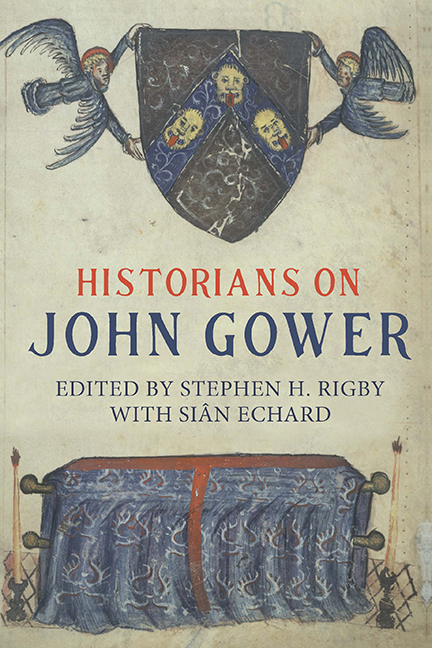Book contents
- Frontmatter
- Dedication
- Contents
- List of Illustrations
- Notes on Editors and Contributors
- Acknowledgements
- List of Abbreviations
- A Note on the References
- Preface: Gower in Context
- PART I Gower’s Life and Works
- PART II GOWER AND LAY SOCIETY
- PART III GOWER AND THE CHURCH
- PART IV GOWER AND GENDER
- PART V GOWER AND POLITICS
- PART VI GOWER AND COSMOGRAPHY
- Select Bibliography
- Index
- VOLUMES ALREADY PUBLISHED
7 - The Papacy, Secular Clergy and Lollardy
Published online by Cambridge University Press: 26 May 2022
- Frontmatter
- Dedication
- Contents
- List of Illustrations
- Notes on Editors and Contributors
- Acknowledgements
- List of Abbreviations
- A Note on the References
- Preface: Gower in Context
- PART I Gower’s Life and Works
- PART II GOWER AND LAY SOCIETY
- PART III GOWER AND THE CHURCH
- PART IV GOWER AND GENDER
- PART V GOWER AND POLITICS
- PART VI GOWER AND COSMOGRAPHY
- Select Bibliography
- Index
- VOLUMES ALREADY PUBLISHED
Summary
An Anti-Ecclesiastical Gower?
Presenting his verse as the voice of ‘all Christian people’, Gower's authorial stance was one of indignant complaint, moral lament and outrage, a stance whose consistently aggressive protest and dissent sought to ‘bring evil to light’ (VC: III.Pro.57). Because ‘our fate nowadays is quite adverse because of our vices’ and ‘things have gone so badly’, he prayed that his labour might ‘accomplish much’ and that others might profit from his work (VC: III.Pro.3, 62, 70). Gower was unfailingly hostile to and critical of the Church, which he believed was corrupt and had fallen away from the ideals of the Gospels (MO: 18445–8). It is not surprising, therefore, that the Church was a major concern throughout his life, as can be seen from all three of his major works. He wrote about it at great length in the Mirour de l’Omme (18420–21780) and in Books III and IV of the Vox Clamantis and it features in the Prologue and some of the tales in Book II of the Confessio Amantis. The condition of the Church is also discussed in some of his later short Latin poems such as his dedicatory Epistola to Archbishop Arundel, the Carmen Super Multiplici and De Lucis Scrutino. It is not surprising that, as a political and public poet, Gower was preoccupied with an institution that had great authority and influence in medieval England and was second only to the Crown in its power. As the means to salvation through its teaching and sacraments it permeated all aspects of life. The great wealth it accumulated and its role as an agent of social control through the church courts reinforced its influence. Its clergy were not only part of an international order but also provided an active, articulate and sometimes critical voice in the English medieval polity. To set Gower's preoccupation with the Church in its historical context three central questions will be addressed here: firstly, how much does his work owe to the clerical stereotypes of the medieval estates satire tradition?; secondly, how radical was Gower in his criticisms of the Church?; finally, can Gower be seen as part of what has been described as a ‘new anticlericalism’ of the later fourteenth century?
- Type
- Chapter
- Information
- Historians on John Gower , pp. 243 - 269Publisher: Boydell & BrewerPrint publication year: 2019



